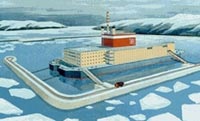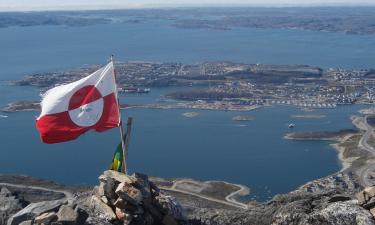USA, Europe and Russia Compete in Energy Technologies
Nearly $2billion will be allocated for the development of solar energy in America. This information was released in a weekly address to the citizens by U.S. President Barack Obama. Department of Energy has funded two companies that plan to build solar thermal plants. One of them will make the list of the largest new energy facilities in the world.

The funds will be provided under the government stimulus program announced by Obama in February. Abengoa Solar company, subsidiary of Spanish Abengoa SA, will receive $1.45 billion from the U.S. government for the construction of one of the world's largest solar power plants. The state of Arizona will host Solona power station, capable of supplying power to over 70 thousand homes. The project will create approximately 1.6 thousand jobs.
Another recipient of funds is the American company Abound Solar Manufacturing that will invest $400 million in the production of thin-film solar cells for stations in Indiana and Colorado. One of the plants in Colorado is already under construction. The second one will be built in Indiana. It will be located in a former manufacturing building of Chrysler, as if illustrating the impending change of technology.
Interestingly enough, Obama pointed at a direct link between leadership in the field of clean renewable energy and global economic leadership.
Obama stated that the US competitors around the world were making unprecedented efforts to develop new energy technologies. Similar plants are built in Germany and in China. Nobody wants to be in second place. These countries realize that the one who will be a leader in clean energy is likely to be leading in the global economy. He added that unless America recognizes this imperative, it risks falling behind. 15 years ago the United States accounted for 40% of the production of solar panels. By 2008 this number has fallen to five percent. “I don’t know about you, but I do not intend to give up American leadership in the industry, as well as U.S. leadership in the global economy,”- said Obama.
Europe, indeed, is the leader in creating alternative energy. Despite the general economic slowdown, the share of renewable energy in Europe has increased from 14.6% in 2006 to 16.3% in 2008.
But, in addition to an attempt to “catch up and outrun”, the United States still has an unsolved issue of obsolete energy infrastructure. “We need to do more than simply build solar power plants. The current energy system operates on the basis of a century-old technology. Maintaining this network is too expensive for us, and besides, it is not sufficiently reliable, which leads to blackouts,” - Obama said in October of last year. According to his estimate the system upgrade will cost $3.4 billion.
The White House is not going to put all energy eggs in one solar basket. The US has begun to revive its nuclear power industry. Speaking at the educational center in the state of Maryland on February 16, President Barack Obama has pledged to allocate $8.3 billion as loan guarantees for construction of a nuclear power plant. The new station will be built in the state of Georgia in place of a similar object put on hold in 1979.
In certain respect Obama’s statement may be considered not only as him turning to the main promise of his campaign, green energy, and an attempt to divert public attention from the terrible oil catastrophe in Gulf of Mexico. It could also be a response to the Russian energy technology PATES, floating nuclear power stations, as well as the discoveries of Russian scientists in the field of solar power generation.
Last week in St. Petersburg at the JSC “Baltic Plant,” a ceremony was held to launch the general floating power unit “Akademik Lomonosov” of the first such station.
The floating plant can be used to provide electricity and heat, and in conjunction with the desalination plant it can be utilized to desalinate sea water. The unit is capable of providing 40 thousand to 240 thousand cubic meters of fresh water every 24 hours.
It is the ability to not only provide energy but also desalinate large quantities of sea water in the growing shortage of fresh water supply that can potentially become a major reason of the demand for floating nuclear power plants by foreign customers.
New energy technologies will become a major competitive advantage in the near future. It is easy to understand that cheap electricity has a positive impact on cost of production and, consequently, increases its competitiveness in world markets.
When it comes to solar power generation, Russia falls far short of all significant players in this emerging market. The volume of production of solar cells is less than 1% of the world volume. There is probably no point in fighting with competitors in the area of silicon cells, although Mr. Vekselberg and Renova are trying to play in this market.
Suggesting something fundamentally new with a higher level of efficiency is characteristic of Russians, and, most likely, is a strategically right decision. We are talking about the so-called cascade cells. The invention of the scientists of the North Caucasus State Technical University is 2-3 times more efficient than a conventional silicon battery.
A tiny element made of gallium arsenide can produce two times more electricity than a large silicon wafer. Since it is several layers thick, it picks up a larger part of the solar spectrum in a few nanometers. Electricity produced this way is half as much as the traditional energy products made of oil and gas. As early as in a year, solar cells of this type will be mass-produced at a plant in Stavropol, News.ru reports.
It will be a full cycle production project, which includes cultivation of nano-heterostructures, chips manufacturing, module assembly, production of sun tracking systems, and assembly of solar photovoltaic installations. The pilot line will be installed in St. Petersburg, while the plant for experimental and serial production will be located in Stavropol region. By 2015, the volume of production of new plants should reach approximately 85 MW per year, and revenues of the design company will reach over 130 million Euros.
There are many areas in Russia where solar batteries can be used. An excellent level of insulation in the Southern Federal District, southern Siberia and the Far East offer excellent opportunities for the development of solar power generation.
In all likelihood, we are facing the establishment of the global energy market, where purchase and sale of energy between the countries and companies will become commonplace. Energy of the future may be more than energy. There are curious theories about replacing the traditional paper money with ”energy money”.
It was no coincidence that Internet giant Google has entered this industry. Earlier this year it filed an application with the Federal Communication Commission for Energy Regulation to obtain a license to operate in the energy sector. This will be done by a separate division - Google Energy.
In 2008, investments of nearly $11 million in the development of geothermal energy were announced. A research investment fund Google.org, that has $ 2 billion in shares of the parent company, was created specifically for these purposes. The company is interested in all traditional alternatives to hydrocarbon fuels - solar, hydrogen, geothermal and wind energy.
However, Russia is now required to create a regulatory framework for a fundamentally new energy market, where energy could be sold even by physical persons who have a local source of energy.
The state program “One hundred thousand solar roofs” was started in Germany a few years ago. House owners invest in the installation of solar panels, after which the excess energy is being sent to a power grid and the extras are paid at higher rates. A similar program “Million of Solar Roofs” was launched in the United States. However, Germans and Americans do not have Russian batteries claimed to be extremely efficient.
Vitaly Salnik
Pravda.Ru
Subscribe to Pravda.Ru Telegram channel, Facebook, RSS!





